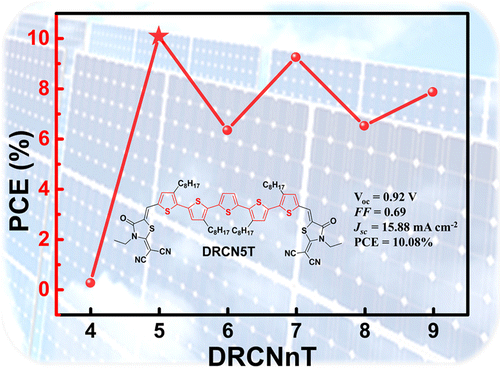
Bin Kan, Miaomiao Li, Qian Zhang, Feng Liu, Xiangjian Wan, Yunchuang Wang, Wang Ni, Guankui Long, Xuan Yang, Huanran Feng, Yi Zuo, Mingtao Zhang, Fei Huang, Yong Cao, Thomas P. Russell, and Yongsheng Chen
J Am Chem Soc, 2015, 137: 3886–3893 [ pdf ]

A series of acceptor–donor–acceptor simple oligomer-like small molecules based on oligothiophenes, namely, DRCN4T–DRCN9T, were designed and synthesized. Their optical, electrical, and thermal properties and photovoltaic performances were systematically investigated. Except for DRCN4T, excellent performances were obtained for DRCN5T–DRCN9T. The devices based on DRCN5T, DRCN7T, and DRCN9T with axisymmetric chemical structures exhibit much higher short-circuit current densities than those based on DRCN6T and DRCN8T with centrosymmetric chemical structures, which is attributed to their well-developed fibrillar network with a feature size less than 20 nm. The devices based on DRCN5T/PC71BM showed a notable certified power conversion efficiency (PCE) of 10.10% under AM 1.5G irradiation (100 mW cm–2) using a simple solution spin-coating fabrication process. This is the highest PCE for single-junction small-molecule-based organic photovoltaics (OPVs) reported to date. DRCN5T is a rather simpler molecule compared with all of the other high-performance molecules in OPVs to date, and this might highlight its advantage in the future possible commercialization of OPVs. These results demonstrate that a fine and balanced modification/design of chemical structure can make significant performance differences and that the performance of solution-processed small-molecule-based solar cells can be comparable to or even surpass that of their polymer counterparts.
